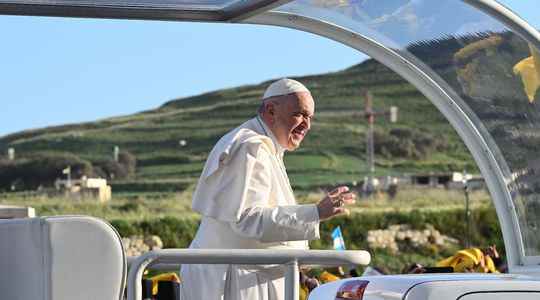On Sunday May 15, Pope Francis celebrates Mass in St. Peter’s Square in Rome. In front of tens of thousands of faithful from the four corners of the world, the pontiff consecrates the canonization of three French and seven other saints. Their portraits are displayed on the facade of the Vatican, under the exhausting heat that grips the Italian capital. From the balcony, the pope speaks before the crowd and recites his homily: “As, in the world, (…) tensions and wars increase, may the new saints inspire ways to come together (… ) in the minds of those who occupy positions of great responsibility and are called to be protagonists of peace and not of war.” An explicit call for peace which does not however break with the criticisms which have revived against the pontiff since the beginning of May.
Earlier, on May 3, the embarrassment is palpable on the face of Pope Francis. Invited to speak in the Italian daily Corriere della Sera he struggles to answer the reporter’s questions. He particularly stumbles on one of them: “Is it right to provide Ukraine with armaments so that it can defend itself against Russian aggression?” After a long time of reflection, the pope launches out: “I do not know how to answer.”
This laudatory response from the pope is revealing of the Church’s relationship to war maintained by the Vatican since its arrival in March 2013: a total refusal of war and an explicit call to lay down arms now even if it means sparing Vladimir Putin. Anchored in a peaceful tradition opposing the possession of nuclear bombs and the sale of arms, the Argentinian clergyman is proving to be an apostle of disengagement from the Church. He notably refused to support the military operation against the Islamic State in 2013.
A realistic diplomacy
“The very realistic diplomacy of the Holy See has the ambition of not being at the service of any State, and does not intend to become the chaplain of a country at war”, analyzed the historian Frédéric De Moal, specialist in Pius XII, in Le Figaro. With this in mind, Pope Francis has made a point of never mentioning Vladimir Putin by name among the leaders responsible for the outbreak of the war.
The position nourishes, in Ukraine, the feeling that the religious authority places on the same scale of responsibility the two belligerents. The Ukrainians also had little taste for the ceremony of Good Friday, April 15, where a Russian woman and the other Ukrainian had carried the cross of Christ together in a process of reconciliation. In the eyes of the rulers of the invaded country, the Holy See is blind to the realities of the conflict.
This misunderstanding was reinforced with the interview given to the Corriere della Sera. Pope Francis points out, in an ambiguous way, the role of NATO whose “barking at the doors of Russia” would refer to shared responsibilities. “An anger that I don’t know if it was provoked,” he wonders about Russia’s entry into the war. “The Pope aims to be a father and an arbiter in the service of peace, (…) which in no way means that, in his heart of hearts, he sends aggressors and attacked back to back”, weighs Frédéric De Moal with Figaro.
A rapprochement with Moscow
However, certain elements suggest that the Pope judges that Moscow is guilty of the war in Ukraine, in particular when he pours out his relationship with Vladimir Putin. Unlike Volodymyr Zelensky, whom he telephoned in the early hours of the war, Pope Francis initially refused to communicate with the Russian president. By castigating the “brutality” of the fighting and after having repeatedly deplored the obstructions of humanitarian convoys in the city of Mariupol, the pontiff is clearly committed to starting a dialogue with the Kremlin. A hand extended several times addressed to the Russian leaders. “I wanted to make a clear gesture for the whole world to see: I went to see the Russian ambassador. I asked them to explain themselves, I said: ‘stop please’, recalls he on May 3.
But Pope Francis has inherited the fruits of a historic rapprochement between the Church and Moscow, operated by Benedict XVI, to which he cannot turn his back at the risk of heightening tension in Europe. The establishment of diplomatic relations between the two parties in 2009 is a shining symbol of this.
The Pope continued in this direction by meeting Kirill, the head of the Russian Orthodox Church, in Cuba, in 2016, two years after the annexation of Crimea. Relations that have cooled since the Russian military intervention since the pope had compared his counterpart to “Putin’s altar boy”. The Church pursues, on a crest, its diplomacy of peace.
